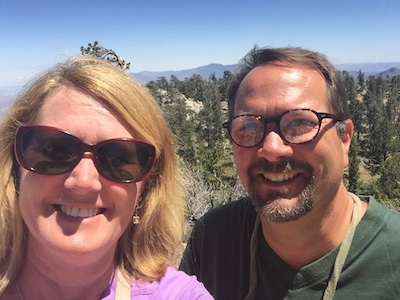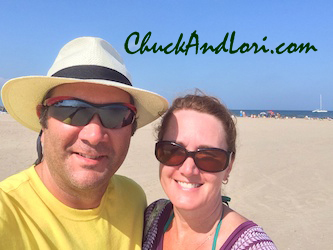In today’s blog, recent sabbatical travelers Andy and LuAnn of www.wetrotabout.com interview full time nomads Chuck and Lori of www.chuckandlori.com. This is the third and final blog in our series of full time travel versus the gap year, and we hope it helps you in deciding whether to hit the road with no plans to come home or to just take some time off to travel the world.
Q. First off Chuck and Lori, tell us a little about yourselves, and tell our readers how we met you guys.
Well, as of 2015 we’ve been married 30 years. Just a few years ago we had a very conventional life: jobs, kids, a nice house in Atlanta. Then things changed radically: Chuck sold his company, both our kids moved out of the house, both of Chuck’s parents—who we’d been caring for—passed away, Lori moved from teaching into administration, and Chuck lost 80 pounds. Life was completely different, and we found ourselves in the midst of empty nest syndrome.
We started talking about the “travel thing” and looking around at travel blogs and discovered this really interesting community of travel couples blogging about their experiences. Chuck decided we too should blog about our experiences, including all the research and preparation and planning from the start, so he started up a blog. Andy came across our blog and saw that we had similar tastes in themes and got in touch. We’ve stayed in touch since then, comparing our experiences as we’ve gone along. We really like this online virtual community of travel couples and have made quite a few friends this way!
Q. What sort of traveling did you guys do before you decided to travel all the time?
We’ve had a passion for (addiction to?) travel since we met. One of the first things we bought together was a pop-up camper, which was a big part of the first vacations we ever took. Later we started taking scuba diving trips to the Caribbean, taking the kids to Florida and Disney World, all the normal family vacations. Chuck has always traveled quite a bit for business (he’s in software too) and whenever possible we tried to piggy-back business travel with vacations. Then in 2001 when a Bahamas vacation fell through, we decided sort of last minute to go to Europe. We loved it and vacations to Europe became our travel passion for the next decade or so. That and the occasional getaway to the Bahamas!
So by the time we started talking about full time travel, we’d been to much of the US and a good bit of Western Europe, but we also realized that to see all there was to see in the world would require a lot more than 2-week vacations here and there!
Q. So how did the full time nomad idea come about? What triggered that big decision?
It all started with a pitcher of frozen margaritas LOL. It actually started with a little career soul-searching on Chuck’s part. After he sold his company he had some free time to think about his next career move, which naturally he spent on planning our last conventional vacation, a big 3-week summer vacation to Europe in 2012. We spent an entire week in Rome, which at the time seemed like an amazingly long stretch of time to spend in a single location, but you have to remember up to then we’d only taken your typical touring vacation of a few days here, a few days there.
After we got back from that vacation, Chuck started thinking of how to travel more, how to travel longer. He took it on almost like a business problem. The biggest challenge, of course, is making income and expenses balance. He started reading and following lots of those travel couple blogs and books, like Tim Ferris’ The 4-Hour Workweek. With the numbers making sense and a plan looking do-able, he pitched the idea of full time travel to Lori…over a pitcher of margaritas at their favorite Mexican restaurant back home.
Q. You guys didn’t sell your house up front; why not just do that from the start if you wanted to travel full time?
Honestly, when we set out from Atlanta in June of 2014 we weren’t entirely convinced that we’d be traveling full time and indefinitely. We flew to Europe on 1-way tickets with only a month or so planned out, but we knew that we’d be back before the holidays. We were thinking of that trip as sort of a “trial run” to see if all the numbers and planning actually worked. It can be sort of hard to believe on paper that you can afford to travel the world all the time, but as so many people have demonstrated, it is possible. Still, we had to prove it to ourselves, and we had to prove to ourselves that we wouldn’t drive each other crazy.
You guys say something similar, that people warned you’d get on each other’s nerves after a few weeks. We were concerned about this too. I mean, we’d been kissing each other good-bye in the mornings 5 days a week (sometimes 6 and 7), together basically only nights and weekends, and now we’re talking about being together 7×24. If that didn’t really work out, we wanted to be able to fall back on our old life.
So our plan initially was to rent out our house, which we were super-successful doing through www.corporatehousingbyowner.com. That way we could keep our home and all our stuff just in case we wanted to give up on full time travel and we only needed to prepare it for people to rent on short-term leases. What we found, like you guys, is that we actually do like being together. So we had been traveling barely a month when we decided, yeah, this is for us. So from there the “trial” was over and we were making plans to sell the house.

Q. How long did you guys prepare to start your travels?
About a year. That was from the time we had a plan on paper to when we planned to start that trial, June of 2014. Part of that date-setting, though, was around our son’s wedding which was in April of 2014. Most of our preparation was getting the house ready and attractive for short-term corporate rentals. We cleaned out and threw out, basically moving all the personal possessions we really wanted to keep into a locked “owner’s closet” off the garage, which of course made it a whole lot easier when we wanted to sell.
Q. How did/do you budget for constant travel?
Everyone has living expenses, no matter where they are and how they live. We all have to pay for room, board, transportation, etc. It’s just that with our budget, where we spend our money and how much we spend for these things is less predictable than most people. We used to spend the exact same amount on our mortgage every month and write the check to the same people every month. Now it can vary from week to week, but amazingly we average far less per day to have a roof over our heads than we used to.
Over the course of 2015 we averaged about $30 a night, a fraction of what we used to spend on mortgage principal and interest, insurance, maintenance, utilities, etc. Some people we know have pushed this average down below $10! We spend about the same on food wherever we are: almost everywhere we stay we have a kitchen, so we prepare our own meals a lot, and you learn how to eat out cost-effectively, such as for lunch rather than dinner, or leveraging the low costs where you might be, like a recent $25 fine-dining experience we enjoyed in Zagreb, Croatia.
You guys mentioned another factor: full time travel forces you to live frugally. We’ve also learned to waste very little. Now we buy only what food we need for the next day or so. We live in comfortable accommodations that are right-sized for a couple on the move, not an entire family staying put for the foreseeable future.
Q. Let’s talk about work. What changes did you guys make to work and careers before traveling?
Everyone talks about downsizing their homes after the kids leave the nest. We asked the question, why not downsize our careers? If our expenses are going to drop, why not adjust our incomes accordingly so we can enjoy more of our time rather than just go somewhere else to work, regardless of how fun that somewhere else might be. That meant working fractionally—part time—and doing work that lends itself to working while traveling. We’ve found that, like living right-sized eliminates waste, so does working right-sized. We’re more focused on what’s important. We’re more effective in our work because we treat our time as precious.
The other big obvious change was to prepare for the mechanics of working remotely. It’s easy to say, “we can work anywhere we have Internet”, and lots of travel bloggers say it, but the mechanics take research and practice. It’s not just a matter of connecting on wifi and voila! you’re up and running. Telecommunications—how you make and receive calls—and time zone differences and meetings and having backup communications all have to be considered. And you have to do it without carting around a trunk while you travel.
Q. How does working on the road work out? Any advantages, disadvantages?
We’ll admit, we’d rather not have to work. But until we retire or win the lottery, we have to work just like everyone else. The main advantages of working while being full time nomads are that we’re more focused, as we describe above, and that we can utilize time zone differences to our advantage: for example, we often do our touring and sightseeing in the mornings before co-workers and clients in the US even wake up, then have meetings and calls in the afternoon and evenings to match the US working times. Often we can get things done quickly because we can work uninterrupted compared to our in-office counterparts, and it’s easy to volunteer to do things “off hours” because they’re not actually off-hours to us.
The only real disadvantages are also those time zone differences. Try as we do, it’s sometimes necessary to take a call or schedule a meeting at odd hours. But the occasional 1:00am or 5:00am call is worth it, in our book, to experience travel as we do. Sometimes you just have to make some tradeoffs, even if you’re a fulltime nomad!
Q. How far out do you set your travel itinerary?
We have both a short-term picture and a long-term picture of our travels. For example, at the moment we are definitively scheduled for the next 3 weeks, then we have things planned here and there for the following couple of months. For the long-term picture we have ideas of where we’ll be, like in Atlanta for the summer and fall, and “another something big” come first part of next year. Andy has Chuck really keen on a trip to New Zealand.
Q. How do you guys decide where you are going next?
There’s a short-term and long-term aspect to this as well. If we have a week-long gap between point A and point B, we try to efficiently look for something interesting between points A and B for that week. Otherwise we try to be smart about our travels to avoid “jumping” around too much. For example, our current travel is focused on Eastern Europe through April; it wouldn’t make much sense to stick a jaunt to India in the middle of March.
On the other hand, a bit of serendipity is nice. For a number of reasons, we enjoy house sitting as part of our travel strategy. Within reason, if we see an interesting house sit that fits into our schedule, we might bend the rules a little bit to accommodate it.
Long term, we just like to daydream about the places we’ve never been and that other travel couples tell us about. Now when we muse, “One day”, we mean it.
Q. How do you do with your travel budget? Generally over? Under?
Like most couples, traveling or not, we go over in some areas and under in others, and then next month it all changes. Budgets are like that, aren’t they? Especially when you’re traveling. But we can also tighten the budget up when appropriate, like here in Eastern Europe almost everything (with perhaps the exception of airfare) is cheaper, so we can tighten up the budget here and apply some surpluses a few months down the road when we return to a more expensive place like the UK.
Long term though, we seem to do pretty well with the budget. The most important part is simply to have a budget and keep an eye on it. Otherwise an “oh-no” moment is inevitable.
Q. What do you miss most while traveling?
Chuck’s reply: just like you guys said, the kids. This past Christmas (2015) was the first we were away from family for the holidays, and it was pretty hard. Thank God for Skype and FaceTime and texting!
Lori’s reply: hamburgers. Really good hamburgers and Mexican food. Oh, and the children too.
Q. What have you learned about yourselves?
That we still like being with each other.
Q. Be honest: doesn’t it feel weird to not have a home?
Definitely at first. But now that we’ve gotten used to it, not at all. In fact we aren’t really quite ready to imagine having a home, especially when our friends talk about their thingamajig breaking or rising premiums or HOA assessments or goofy neighbors or whatever. It all sounds so icky to us at the moment.
Q. Any regrets? Would you do anything differently?
Not a one, except perhaps trying to do it sooner than we did.
Q. What’s up next for you guys, short run and long run?
Well, we’re going to hitch a ride home in May on the Queen Mary 2: arriving home passing under the Statue of Liberty is always a great way for an American to come home. Then for the rest of 2016 we plan to home base in Atlanta, greet our new grandson due on June first, see our daughter married off in September, and as we promised the kids, be home for the holidays this year. Our travels during this time, then, will be focused on the Southeast, which is home to us and is full of great places and people to see.
After that? Well, a several-month trip to New Zealand, Australia, and the Philippines is high on the list. But so is South America and a few months of island-hopping in the Caribbean.
Q. What advice do you have for someone considering full time travel versus a sabbatical?
Obviously unless you are absolutely certain you want to do full time travel and can make a go of it, don’t just sell everything you own and do it. A travel blogger who encourages you to “just do it” is a travel blogger not worth reading. Full time travel takes not only a lot of planning but also a lot of introspection. Even then be sure to have an alternative plan to fall back on. We think a gap-year or sabbatical trip is a great trial run, not because that’s what we had success with, but because that’s how a lot of full time nomads seem to get a successful start.
We think also that there’s a travel philosophy difference for full time travel versus sabbatical travel. If your passion is travel for travel’s sake and you have a truly insatiable curiosity for cultures and people, you’re probably well-suited to be a full-time nomad. If you have a specific bucket-list of places you’ve always wanted to see, you’re probably better suited to plan a sabbatical.
Bottom line, either way you go, you should always keep in mind that the most rewarding travel experiences are not the museums and the historical sites and the natural wonders and the art galleries. The most rewarding travel experiences are the people you meet along the way.








